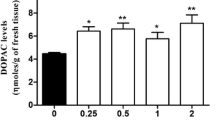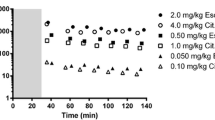Summary.
The effect of acute pretreatment with MK-801 on the binding in vivo of both 3H-N-methylspiperone (NMSP) and 3H-raclopride (RAC) were compared in mice. In the striatum, MK-801 significantly increase 3H-NMSP binding, whereas no significant alterations in 3H-RAC binding were seen. In contrast, binding in the cerebral cortex of both radiolabeled ligands was not changed by MK-801. Kinetic analysis revealed that the increase in 3H-NMSP binding induced by MK-801 was due to an increase in the rate constant k3 (k3 = kon·Bmax). In vivo saturation experiments showed that Bmax for 3H-NMSP binding was relatively unchanged and an increase in the apparent association rate constant (kon) was the main reason for an increase in the k3 for 3H-NMSP binding. As 3H-RAC binding is known to be much more sensitive to competitive inhibition than is 3H-NMSP binding, these results strongly suggest that factors other than competition by endogenous dopamine may contribute to changes in receptor binding in vivo caused by NMDA-antagonism.
Similar content being viewed by others
Author information
Authors and Affiliations
Additional information
Received August 12, 1998; accepted September 30, 1998
Rights and permissions
About this article
Cite this article
Inoue, O., Wakahara, S., Kobayashi, K. et al. Enhancement of 3H-N-methylspiperone binding but not 3H-raclopride binding in mouse striatum by MK-801: evidence that factors other than competition by endogenous dopamine are responsible for changes in D2 receptor binding in vivo. J Neural Transm 106, 131–137 (1999). https://doi.org/10.1007/s007020050145
Issue Date:
DOI: https://doi.org/10.1007/s007020050145




